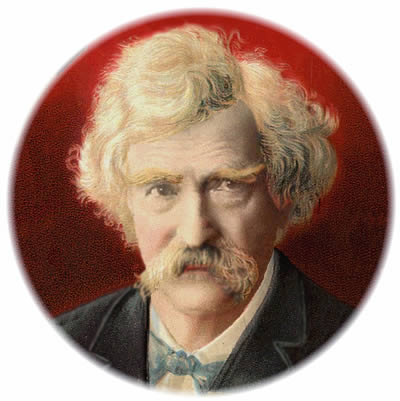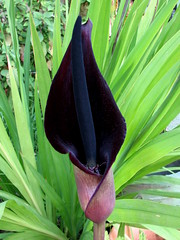Mark Twain to Barack Obama, on the perils and pleasures of the Holy Land

Barack Obama, the US president, has been given books by Hugo Chavez of Venezuela, among others, and the latest was a present from Israel's prime minister Bibi Netanyahu. I was intrigued by the choice of title. Obama was presented an excerpt from "Innocents Abroad, by Mark Twain, in special bookbinding for the White House Library.
What can be read into all this?
Mark Twain had toured a "backwater of the Ottoman Empire whose inhabitants had no sense of a separate national identity. Though Palestinian nationalism and resistance is a reality that Israel must contend with today, it originated and gained traction as a reaction to the return of large numbers of Jews to Israel.
Twain's classic “Innocents Abroad” is so popular with Zionists that the chapters from his travelogue on the Middle East have been translated into Hebrew and published as a separate book, entitled Pleasure Excursion to the Holy Land.
Click here to see the complete Text:
///////
So here's what Mark Twain had to say about Israel
It is a hopeless, dreary, heart-broken land.
Small shreds and patches of it must be very beautiful in the full flush of spring, however, and all the more beautiful by contrast with the far-reaching desolation that surrounds them on every side. I would like much to see the fringes of the Jordan in spring-time, and Shechem, Esdraelon, Ajalon and the borders of Galilee -- but even then these spots would seem mere toy gardens set at wide intervals in the waste of a limitless desolation...Perched on its eternal hills, white and domed and solid, massed together and hooped with high gray walls, the venerable city gleamed in the sun. So small! Why, it was no larger than an American village of four thousand inhabitants, and no larger than an ordinary Syrian city of thirty thousand. Jerusalem numbers only fourteen thousand people
We dismounted and looked, without speaking a dozen sentences, across the wide intervening valley for an hour or more; and noted those prominent features of the city that pictures make familiar to all men from their school days till their death. We could recognize the Tower of Hippicus, the Mosque of Omar, the Damascus Gate, the Mount of Olives, the Valley of Jehoshaphat, the Tower of David, and the Garden of Gethsemane and dating from these landmarks could tell very nearly the localities of many others we were not able to distinguish.
I record it here as a notable but not discreditable fact that not even our pilgrims wept. I think there was no individual in the party whose brain was not teeming with thoughts and images and memories invoked by the grand history of the venerable city that lay before us, but still among them all was no "voice of them that wept."
There was no call for tears. Tears would have been out of place. The thoughts Jerusalem suggests are full of poetry, sublimity, and more than all, dignity. Such thoughts do not find their appropriate expression in the emotions of the nursery.
Just after noon we entered these narrow, crooked streets, by the ancient and the famed Damascus Gate, and now for several hours I have been trying to comprehend that I am actually in the illustrious old city where Solomon dwelt, where Abraham held converse with the Deity, and where walls still stand that witnessed the spectacle of the crucifixion.
....I need not speak of the wonderful beauty and the exquisite grace and symmetry that have made this Mosque so celebrated -- because I did not see them. One can not see such things at an instant glance -- one frequently only finds out how really beautiful a really beautiful woman is after considerable acquaintance with her; and the rule applies to Niagara Falls, to majestic mountains and to mosques -- especially to mosques.
The great feature of the Mosque of Omar is the prodigious rock in the centre of its rotunda. It was upon this rock that Abraham came so near offering up his son Isaac -- this, at least, is authentic it is very much more to be relied on than most of the traditions, at any rate. On this rock, also, the angel stood and threatened Jerusalem, and David persuaded him to spare the city. Mahomet was well acquainted with this stone. From it he ascended to heaven. The stone tried to follow him, and if the angel Gabriel had not happened by the merest good luck to be there to seize it, it would have done it. Very few people have a grip like Gabriel -- the prints of his monstrous fingers, two inches deep, are to be seen in that rock to-day.
This rock, large as it is, is suspended in the air. It does not touch any thing at all. The guide said so. This is very wonderful. In the place on it where Mahomet stood, he left his foot prints in the solid stone. I should judge that he wore about eighteens. But what I was going to say, when I spoke of the rock being suspended, was, that in the floor of the cavern under it they showed us a slab which they said covered a hole which was a thing of extraordinary interest to all Mohammedans, because that hole leads down to perdition, and every soul that is transferred from thence to Heaven must pass up through this orifice. Mahomet stands there and lifts them out by the hair. All Mohammedans shave their heads, but they are careful to leave a lock of hair for the Prophet to take hold of. Our guide observed that a good Mohammedan would consider himself doomed to stay with the damned forever if he were to lose his scalp lock and die before it grew again.
We ascended the Hill of Evil Counsel, where Judas received his thirty pieces of silver, and we also lingered a moment under the tree a venerable tradition says he hanged himself on.
We descended to the canon again, and then the guide began to give name and history to every bank and boulder we came to: "This was the Field of Blood; these cuttings in the rocks were shrines and temples of Moloch; here they sacrificed children; yonder is the Zion Gate; the Tyropean Valley, the Hill of Ophel; here is the junction of the Valley of Jehoshaphat -- on your right is the Well of Job." We turned up Jehoshaphat. The recital went on. "This is the Mount of Olives; this is the Hill of Offense; the nest of huts is the Village of Siloam; here, yonder, every where, is the King's Garden; under this great tree Zacharias, the high priest, was murdered; yonder is Mount Moriah and the Temple wall; the tomb of Absalom; the tomb of St. James; the tomb of Zacharias; beyond, are the Garden of Gethsemane and the tomb of the mary; here is the Pool of Siloam, and -- "
We said we would dismount, and quench our thirst, and rest. We were burning up with the heat. We were failing under the accumulated fatigue of days and days of ceaseless marching. All were willing."
 So that's what's on Barack's reading table.
So that's what's on Barack's reading table.







































